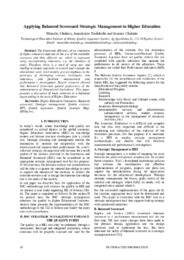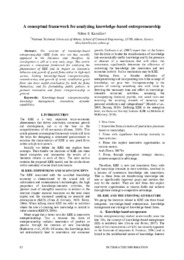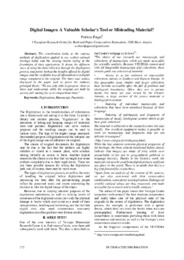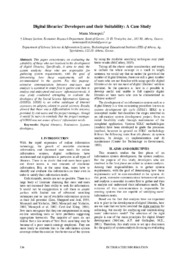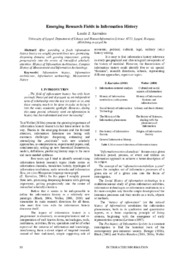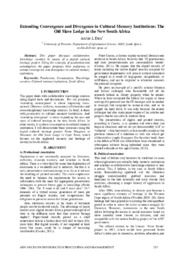Browsing Βιβλιοθηκονομία και Επιστήμη της Πληροφόρησης / Library and Information Science by Author "University of Peloponnese"
Now showing items 1-20 of 62
-
Advances on information processing and management
Σακάς, Δαμιανός Π.; Sakas, Damianos P.; Giannakopoulos, Georgios A.; Γιαννακόπουλος, Γιώργος Α.; Emerald Group Publishing Limited; Technological educational Institute of Athens; University of Peloponnese; National And Kapodistrian University of Athens; Mednet Hellas, The Greek Medical Network; 2nd AMICUS Workshop (2011) -
Aggregating Metadata for Europeana: the Greek paradigm
Κουλούρης, Αλέξανδρος; Μπάνος, Ευάγγελος; Γαρουφάλλου, Εμμανουήλ; Garoufallou, Emmanouel; Koulouris, Alexandros; Banos, Vangelis (2011)Europeana is an evolving service that tries to be a single access point for Europe’s cultural heritage. The metadata aggregation for Europeana is a procedure that needs interoperability and software tools for transforming ... -
Applying Balanced Scorecard Strategic Management in Higher Education
Τσολακίδης, Αναστάσιος; Χαλάρης, Ιωάννης; Χαλάρης, Μανώλης; Tsolakidis, Anastasios; Chalaris, Ioannis; Chalaris, Manolis (2011)The functional efficiency of an institution of higher education depends on the size of the available resources and their efficient use, which is expressed using corresponding indicators e.g. the duration of study. Therefore, ... -
Approaching Information as an Integrated Field: educating Information Professionals
Κυριακή-Μάνεση, Δάφνη; Γιαννακόπουλος, Γεώργιος Α.; Ζέρβος, Σπύρος; Giannakopoulos, Georgios A.; Zervos, Sryridon; Kyriaki Manesi, Daphne (2011)This is a brief presentation of the framework and philosophy followed by the Department of Library Science and Information Systems in the development of its new curriculum. The belief that information organizations, such ... -
Archiving as an Information Science. Evidence from a Survey Carried out on a Sample of Greek Students
Γιαννακόπουλος, Γεώργιος Α.; Κουμαντάκης, Ιωάννης; Giannakopoulos, Georgios A.; Koumantakis, Ioannis (2011)New technology has always been and certainly is today a key factor in the evolution of information. The emergence of archival science as an autonomous discipline and its integration into the wider field of information ... -
Attitudes of University Librarians and Information Scientists towards the Draft Code of Library Ethics to Present a Model for Final Library Ethical Codes
Latifi, Mahsoomeh; Zandian, Fatemeh; Siamian, Hasan (2011)This research performed to survey attitudes of Iranian Academic librarians and faculty members towards the draft code of library professional ethics for Iran. The researcher used the survey research methodology for this ... -
Building Digital Collections for Archeological Sites: metadata Requirements and CIDOC CRM Extension
Νικολαϊδου, Μάρα; Γκρους, Γεώργιος Σ.; Gkrous, Georgios S.; Nikolaidou, Mara (2011)Cultural heritage information management and provision can be improved by the usage of Internet and related technologies. The research effort presented in this paper focuses on the creation of a digital collec- tion representing ... -
Changing Roles of Health Librarians with Open Access Repositories
Βλαχάκη, Ασημίνα; Urquhart, Christine; Vlachaki, Assimina (2011)The aim is to explore how health library and information professionals can expand their current work roles by supporting open access initiatives particularly the development of institutional repositories. A role competency ... -
A conceptual framework for analyzing knowledge-based entrepreneurship
Κανέλλος, Νίκος Σ.; Kanellos, Nikos S. (2011)The concept of knowledge-based entrepreneurship (KBE from now on) has recently appeared in the literature and, therefore, its investigation is still at a very early stage. This article presents a conceptual framework for ... -
Culture in Modern Times in the Frame of Luhmann’s System Theory
Χουρναζίδη, Αναστασία; Chournazidis, Anastasia (2011)In his System Theory Luhmann describes the transition to the Modern Times as an explosion from the uniformity of hierarchical classification to the diversity of hierarchical classification: a classification, which contains ... -
Developing a national database on Librarianship and Information Science. The case of E-VIVA, the Hellenic fulltext database
Τσιμπόγλου, Φίλιππος Χ.; Σακκά, Ελένη Κ.; Κουκουνίδου, Βασιλική (Σύλβια) Β.; Tsimpoglou, Filippos Ch.; Koukounidou, Vasiliki (Sylvia) V.; Sakka, Eleni K. (2011)The paper presents the Hellenic fulltext database on Librarianship and Information Science E-VIVA (Ellinike Vivliothikonomike Vase), developed by the Library of the University of Cyprus. The objectives of E-VIVA is to ... -
The Digital Archives System and Application Optimized for the Tradition Knowledge Archives
Chan, Jeon Hong; Hwang, In Deok.; Park, Jae Hak.; Sim, Hyeok.; Gwon, U won.; Park, Soon Cheol. (2011)In this paper, we propose solution for the storing and conjugating of the ever-growing traditional knowledge archives system. Dublin Core is used in order to manage data and the Web 2.0 platform was used to utilize data ... -
Digital Images: a Valuable Scholar's Tool or Misleading Material
Engel, Patricia (2011)The contribution looks at the various methods of digitization applied to our written cultural heritage today and the varying intents laying at the foundation of their application. It shows the different ways of using the ... -
Digital libraries’ Developers and their Suitability: a Case Study
Μονόπωλη, Μαρία; Monopoli, Maria (2011)This paper concentrates on evaluating the suitability of those who are involved in the development of digital libraries. Specifically, it aims to study the system analysts; those who are responsible for gathering system ... -
Dimensionality Curse, Concentration Phenomenon and the KDB-tree
Ευαγγελίδης, Γεώργιος; Κουιρουκίδης, Νικόλαος; Evangelidis, Georgios; Kouiroukidis, Nikolaos (2011)The problem of indexing large volumes of high dimensional data is an important and popular issue in the area of database management. There are many indexing methods that behave well in low dimensional spaces, but, in high ... -
E-journal and Open Access Journal Publishing in the Humanities: preliminary Results from a Survey among Byzantine Studies Scholars
Τσουκαλά, Βικτωρία; Σαχίνη, Εύη; Sachini, Evi; Tsoukala, Victoria (2011)This paper presents the preliminary results of a survey conducted by the National Documentation Centre/NHRF in the fall of 2010 among specialists in Byzantine Studies. The survey sought to assess needs and satisfaction ... -
Emerging Research Fields in Information History
Karvalics, Laszlo Z. (2011)After providing a fresh information history basics we roughly present three new, promising, deepening domains with growing importance, getting progressively into the center of intensified scholarly attention: History of ... -
Exploiting the Search Culture Modulated by the Documentation Retrieval Applications
Καρανικόλας, Νικήτας Ν.; Σκουρλάς, Χρίστος; Karanikolas, Nikitas N.; Skourlas, Christos (2011)Users Interaction with various wellestablished tools of documentation retrieval and the influence from each tool to the other ones have contributed in the creation of some search culture which is shared between the design ... -
Extending Convergence and Divergence in Cultural Memory Institutions: the Old Slave Lodge in the New South Africa
Dick, Archie L. (2011)This paper discusses collaborative knowledge creation by means of a digital cultural heritage project. Using the concepts of production and consumption, the paper proposes their usefulness to extend convergence and divergence ... -
An Extensive Experimental Study on the Cluster-based Reference Set Reduction for Speeding-up the k-NN Classifier
Δέρβος, Δημήτρης; Ευαγγελίδης, Γεώργιος; Ουγιάρογλου, Στέφανος; Dervos, Dimitris; Evangelidis, Georgios; Ougiaroglou, Stefanos (2011)The k-Nearest Neighbor (k-NN) classification algorithm is one of the most widely-used lazy classifiers because of its simplicity and ease of implementation. It is considered to be an effective classifier and has many ...


